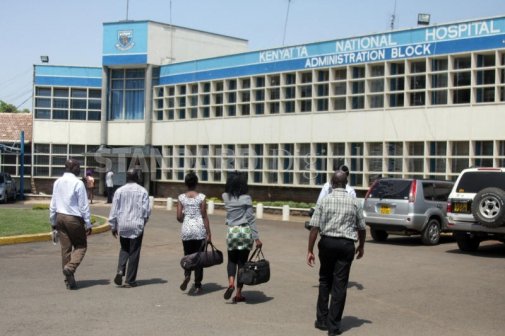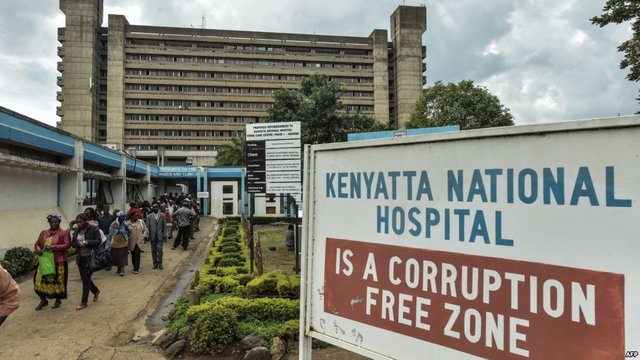Clinics ought to be places that enhance prosperity, where individuals feel safe and are allowed to leave toward the finish of their treatment. Unfortunately, this is frequently not generally the situation. In a few sections of the world, individuals are confined for a considerable length of time for not having the capacity to pay their hospital expenses or are rejected care when they can never again pay.

This training is especially common in some sub-Saharan nations, yet additionally happens in Asian nations where there is poor access to moderate human services. Healing facility confinements negate a few worldwide laws and speak to a gross infringement of human rights, particularly the same number of prisoners endure manhandle amid their authorized clinic remain.
In Kenya, healing facility confinements have been accepting a great deal of media scope. Because of low levels of general wellbeing spending, numerous patients are charged high expenses for their care, which drives a few people to defer looking for treatment when unwell, while others store up high hospital expenses that they can't manage. Clinics are frequently looked with a choice of regardless of whether to give life-sparing consideration or not and finding approaches to recover unpaid bills. Somtimes this outcomes in confining patients.

For instance, in 2009, Kenyatta National Hospital was compelled into discharging 44 kept patients after a TV station utilized a concealed camera to demonstrate them being held in a locked room. All the more as of late, in 2017, a lamenting mother who had lost four kids in a mishap was kept in a Migori County Hospital, and for another situation, the body of a 73-year-old lady was not discharged to her family for over a year.
This training has turned out to be widespread to the point that Kenyan government officials routinely utilize what are known as 'put aside recompenses' to anchor the arrival of kept patients. In June 2017, one representative in Nairobi entered a healing center with a huge total of money to discharge patients. He paid the extraordinary hospital expenses of no less than 10 patients, including a 89-year-old lady.
The confinement of patients isn't elite to Kenya yet is across the board in sub-Saharan Africa, most strikingly in Nigeria, the Democratic Republic of Congo, Ghana, Cameroon, Zimbabwe and Uganda, however there is additionally proof of the training in India and Indonesia.
An ongoing examination paper by Chatham House, Hospital Detentions for Non-installment of Fees: A Denial of Rights and Dignity, demonstrates that healing facility detainments result in patients being coercively isolated from their families and getting to be not able keep up their occupations. There are reports of families selling area and dairy cattle to clear healing center obligations. This isn't just mentally upsetting, however can result in the poorest individuals sliding into more noteworthy destitution.
There is constrained examination into the size of confinements, with most reports originating from nearby media sources. An ongoing report in the Democratic Republic of Congo found in one clinic over a six-week time span in 2016 that 54 for each penny of ladies who had conceived an offspring and were qualified for release were confined for the non-installment of client charges. At one healing facility in Kenya, 53 for every penny of uninsured guardians of kids whose tumor treatment had been pulled back said they had been confined for non-installment.
Patients, who are restoratively fit for release and who can't meet medicinal costs might be held in soiled conditions. Those well on the way to be confined are new moms who have had confused conveyances that required crisis medical procedure, frequently not met by government financing.
Another basic gathering of prisoners are individuals admitted to healing center requiring crisis mind, after serious consumes or auto collisions for instance. The mishandle these individuals need to continue can be stunning. In 2015, it was accounted for that another mother was anchored to a urinal pipe in Lagos,
Nigeria, when unfit to pay her clinic charge in the wake of getting treatment following difficulties amid the birth. Reports from Kenya into comparable practices demonstrated that 60 ladies were kept alongside a flooding can. Ladies from another office
detailed being forced into having intercourse with doctor's facility staff to pay their bills.
There are two methodologies that administrations could take to end healing center detainments. One would be for nations to just fugitive the training, with sanctions for healing centers that proceed with it. Anyway that by itself may not be adequate, as those requiring crisis care may essentially be denied treatment on the off chance that they seem unfit to pay. For instance in 2016 in Cameroon, a nation with high quantities of restorative prisoners, a relative endeavored to play out a cesarean area on the means of a clinic that had denied access to a lady who had not possessed the capacity to pay ahead of time for her care. The mother and her unborn twins kicked the bucket prompting exhibitions. This case demonstrates that essentially restricting the training without transforming the wellbeing framework may insufficient to guarantee that rights to treatment are met.
The second technique would be the presentation of an openly financed wellbeing framework that accomplishes general wellbeing scope. This would guarantee that individuals could get the care they require without torment monetary hardship. All inclusive wellbeing scope is a particular focus in the UN's Sustainable Development Goals and is a set up approach to enhance wellbeing results, increment monetary development and lower wellbeing related impoverishment. Nations with an abnormal state of freely financed wellbeing scope don't encounter healing center confinements. Widespread wellbeing scope would lessen money related hardship for patients as well as invalidate the requirement for doctor's facilities to keep patients for non-installment. Political weight at the most abnormal amount is expected to guarantee these changes are successful. Political pioneers should be made mindful that it is unsuitable to enable healing centers to bolt up defenseless individuals and it would be to their greatest advantage to ban the training.
There have been two cases of this weight working as of late. In Burundi in 2005, after an accursing Human Rights Watch report about doctor's facility confinements, President Pierre Nkurunziza discharged new moms, their infants and youngsters from the nation's doctor's facilities. Inside a half year, he reported that all wellbeing administrations for these gatherings would be accommodated free. So also in 2003, because of political weight, Turkey's recently chosen Justice and Development Party government prohibited restorative confinements and propelled real wellbeing financing changes that conveyed the nation near widespread wellbeing scope inside 10 years.
Doubtlessly comparative weights are working in Kenya also, with Chatham House's report producing impressive media scope there. Esther Passaris, a noticeable MP and dissident for ladies' rights, approached President Uhuru Kenyatta to scrap New Year festivities and utilize the cash to subsidize the arrival of medicinal prisoners. She has been posting video cuts via web-based networking media of her going up against healing center staff keeping patients. With President Kenyatta reporting in his New Year message that 'the times of doctor's facility costs bankrupting families will end', may Kenya be the following nation to prohibit clinic confinements and in the process make a noteworthy stride towards widespread wellbeing scope?
Thank you so much guys for sparing you time to read my blog. See you in my Next Blog, Take Care..